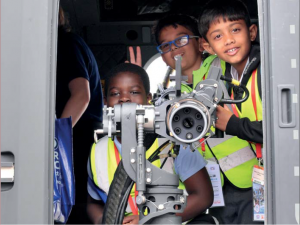It isn’t just the state that benefits from militarism. The arms trade also stands to gain from public acceptance and increased awareness among young people and opportunities to recruit them. Arms companies profit from a more militarised society where weapons and military might are accepted as necessary and even symbols of prestige. Their social license to operate is also strengthened by their role as employers and their involvement in the public sector and public events. Arms companies sponsor military events such as Armed Forces Day and fundraising events for Remembrance. They benefit from the support given by the public to these events and an image of public respectability.
Along with the military, they are also increasingly involved in education, through direct sponsorship of schools and involvement in their curriculum, as well as widespread provision of learning activities related to STEM (science, technology, engineering and maths) education. They also sponsor careers events, national STEM awards and challenges, undergraduate programmes and activities for youth organisations.
The benefits to arms companies of this involvement in education are many. Not only does it steer interested and work-ready students towards a career in the arms industry and provide mechanisms for directly recruiting them, it helps to create an acceptance of them among young people and society at large. Their role as providers within education and other activities for young people masks their primary purpose and blurs the boundaries between acceptable and unacceptable, ethical and immoral. This is aided by the association of communities with companies which bring jobs and economic security. The government heavily promotes the message that the defence and security sector is vital for employment.
Universities are fertile recruiting grounds for the military and arms companies and both have numerous links and partnerships with universities across the UK. Military interests tap heavily into the intellectual capital of university communities as students and staff are channelled into military research and employment.
Not only do the military and arms companies have common interests, they have a very close working relationship. Campaign Against Arms Trade has researched the corrupt ‘revolving door’ for powerful figures between the arms trade and government which gives the arms industry a huge amount of political influence. A close relationship between commercial interests, the military and political decision-making is a key factor of militarism.
Like the military, arms companies present a sanitised image which skirts around the reality of what their products are actually used for. BAE Systems’ promotional video for students and parents as a partner of Portsmouth University Technical College fails to mention that it is a company that manufactures weapons systems.
However, as they directly profit from conflict, arms companies lack the legitimacy of the military, and can sometimes be easier to challenge and oppose.
Answering questions
Don’t we need to be able to defend ourselves and have the technology to do it?
The damage the arms trade does is a root cause of so many of the world’s problems. Many of its practices are highly unethical. The more this is normalised, the more difficult it is to change.
Isn’t arms company influence on universities relatively small?
Some universities have strong partnerships with arms companies and some university departments receive a large proportion of their funding from military research. This will shape their priorities and perspectives.
What’s wrong with arms companies passing on engineering skills to young people?
Whether the activities are about armed drones or not directly related to the defence industry, the delivery of exciting learning activities by arms companies normalises weapons technology and legitimises the company’s operations.
Why shouldn’t arms companies provide STEM activities free to young people?
Science, engineering and technology activities and careers advice are weighted towards industries with agendas and outputs that contribute to some of the very threats the STEM community must answer. We need STEM graduates to transition the defence economy towards more socially useful production.
Shouldn’t arms companies put something back into the community?
Arms companies should not be able to whitewash their involvement in war and all the dubious moral questions that raises by funding local services and events. Human rights and other ethical concerns about a company’s operations can not be ignored, particularly if they are involved in the education of the next generation.
BAE Systems
BAE Systems is the UK’s largest arms company and almost all of its profits come from selling arms.2 The company fuels conflict with its production of fighter aircraft, warships, nuclear missile submarines, armoured vehicles, missiles and small arms ammunition. It is also developing new weapons systems including lethal autonomous weapons and laser directed energy weapons which it claims will change “the nature of warfare”. BAE Systems is the main company implicated in the supply of arms from the UK used by Saudi Arabia to attack the civilian population of Yemen. Its armoured vehicles were used by Saudi Arabia in Bahrain to support the repression of democracy protests in 2011.
While the House of Lords ruled in 2008 that corruption investigations against the company should be stopped for national security reasons, BAE Systems has paid fines or settlements in corruptions cases elsewhere.
The National Memorial Arboretum, the Royal British Legion’s centre for Remembrance, is sponsored by BAE Systems and Boeing Defence UK among others.
BAE Systems partners with the RAF and the Royal Navy to deliver its STEM roadshow to hundreds of schools each year. The company sponsors a school in Barrow in Furness, where it is a major employer, as well as four university technical colleges.
BAE Systems has many collaborations with UK universities for research projects. It recently announced five partnerships with specialist universities, where a BAE employer will be embedded in the university.
The ‘Big Bang Fair’, which attracts groups of students from primary and secondary schools, is sponsored by some of the world’s top 100 arms companies: BAE Systems, Rolls-Royce, Airbus, Leonardo and Thales – as well as the army, navy, RAF and MoD.


